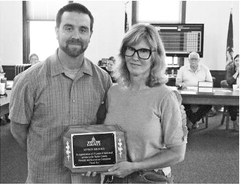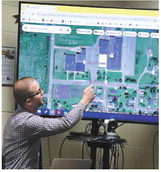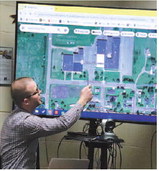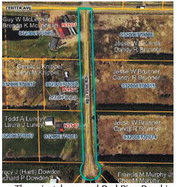County board OKs borrowing agreement


Taylor County will allow internet developer Bug Tussel to use an additional $5 million of the county’s borrowing capacity in order to move forward with expanding access to affordable high speed internet service to rural portions of the county.
The company is currently building 18 communication towers around the county to provide fixed-point wireless internet to rural portions of the county. Three towers are currently live with customers on them. Additional towers are expected to go live in the next few weeks and the projection is for all the towers to be live by the end of the year. This will dramatically increase access to high speed internet in rural portions of the county. The additional borrowing capacity is needed to have the company match payment in order to secure a portion of the $1.2 billion in federal grant funding that is becoming available for internet projects in the state to extend fiber to the home.
State law allows counties to borrow up to 5% of the equalized value of the property in the county. For Taylor County the maximum amount of debt available is about $107 million. Taylor Countyhas only a fraction of that amount in longterm debt.
The county had previously agreed to allow Bug Tussel to use some of the unused debt capacity to secure revenue bonding for the internet company at a reduced rate than if it was through the private market. Bug Tussel is working with more than 20 counties in the state in similar agreements. In return, Bug Tussel is responsible for the debt service payments as well as making a payment to the county for allowing use of the debt.
According to broadband chairman Mike Bub, the county has already received $100,000 in payments from Bug Tussel.
The risk is that if the company were to go under, the county would be liable for the money borrowed. However, Bub noted that this was unlikely to happen and if it did, the county would have claim on any towers and infrastructure Bug Tussel installed in the county.
“We are not paying out any tax dollars,” Bub said. Supervisor Darrell Thompson questioned the risk to the county. “Aren’t we jeopardizing the county to the tune of $5 million?”
“Technically,” replied Bub. However he emphasized that the risk is minimized with the assets of the company securing them. He said the alternative to working with Bug Tussel is to try to use tax levy dollars to fund broadband expansion, which would cost far more than what the county would be able to do.
See COUNTY on page 10 Bub noted that when the broadband project was started it was with the goal of having broadband internet to consumers in the county by 2025. He said the county has invested in its middle-mile network with WANRACK and is looking to build off of that to work to get access to residents.
Supervisor Scott Mildbrand noted he opposed government debt of any kind and was opposed to tying up an increasing amount of the county’s debt capacity in internet projects. “This decision is for me is really difficult,” he said.
“Our taxpayers aren’t paying this bill,” Bub said of allowing Bug Tussel to tap into county borrowing capacity.
“It is no different than cosigning a loan,” Mildbrand said, noting “Debt is debt and someone has to pay it off.”
Bub said that one of the challenges is that the grant rules set by the Public Service Commission a few weeks ago give companies such as Bug Tussel only until August 1 to be able to apply for funds. Bub said it was important to take action now in order to ensure the county could qualify for grant funds this year rather than having to wait to apply until the grant cycle reopens next year.
Supervisor Jim Gebauer supported continuing with Bug Tussel and approving the additional use of the county’s borrowing capacity. “It is a very big project,” he said, adding that the county should see it through to the end.
In the end, the resolution was approved on a voice vote with Thompson opposed.
Hangar purchase
Taylor County will purchase an unused hangar from Weather Shield for a price of $150,000.
The board approved purchasing the hanger on a 14-2 vote with Mildbrand and Rod Adams opposed. Weather Shield stopped having a corporate jet several years ago and no longer needs the hanger, the company approached the county with the offer to sell the hangar earlier this summer. While hangars are owned by companies and individuals, the land they are on is leased by the airport with the county having right of first refusal to purchase them if they become vacant. Federal airport rules limit what can be done with hangars prohibiting most non-airplane related uses.
Chuck Zenner, who chairs the airport committee, explained that the airport has funds available within the airport reserves to purchase the hangar without needing to tap into any additional county funds. The county receives federal funding each year from airport fees to help pay for expenses and improvements. The money that Zenner referenced is what was reimbursed to the county following the airport expansion project a decade ago.
“I am against the purchase of the Weathershield Hangar,” Mildbrand said, saying he felt the county would be better served putting money toward the eventual upgrading of the terminal building rather than purchasing a hanger.
According to Zenner, there is a need for short-term hangar storage space for people flying into the airport. With the size of the hangar it would be able to accommodate some of the larger corporate aircraft that stop in the area on a regular basis.
Zenner also raised the possibility of using the remainder of the building for other purposes including as a potential terminal or for an aviation-related business. Zenner noted that the price was a very good deal for the county given what it would cost to build a hangar that size.
“Sometimes we have good assets and we don’t use them or promote them,” Bub said supporting the purchase. He said he looked forward to having a new airport manager who would do more to promote the airport and work to generate more revenue there.
In other business, board members:
• Approved adopting a change in the employee handbook requiring that all county -owned vehicles shall have tracking devices on them to allow the county to monitor their locations. The cost for the monitoring is $20 per vehicle, per month. Board member Tim Hansen, who voted against the policy change, questioned where the money to pay for it would be coming from. Each department that owns county vehicles would be responsible for having it as part of their budgets. The patrol squads in the sheriffs’ department and the highway vehicles already have GPS tracking on them.
• Approved a resolution to support state funding to establish a crisis facility to serve northern Wisconsin. The region has limited resources when it coms to inpatient crisis care for individuals with mental illness and the county is joining with others in urging the state to rectify this by opening a new regional center or providing subsidies for private groups seeking to open a center in the region.
• Approved a resolution calling for the state to provide additional state budget money to cover the non-federal share of medical assistance, community support and crisis services. This is a measure endorsed by the Wisconsin Counties Association to have more of the cost of these mental health services come from the state level rather than be carried by local taxpayers. Human Services Director Suzanne Stanfley said they are hoping for support statewide and that it be included in the next biennial budget. Work will begin on the state budget in January 2025.
• Approved a resolution declaring August 6 National Night Out. Rhianna Schmidt of the Taylor County Health Department is working on the project to get Wisconsin active in the national effort that promotes strong policecommunity partnerships and neighborhood camaraderie with the goal of making neighborhoods “safer more care places to live and work.” Events are being planned to be held at the Medford Area Elementary School that evening with touch a truck opportunities and information for families.
• Approved entering into the settlement agreement with the Kroger Company for opioid settlement. Major pharmaceutical companies and retailers have been settling lawsuits about overprescribing and distribution of opioids and the county is joining into the settlement in order to get some of the settlement money. It was noted the amount that has come to Taylor County from previous settlements is far less than what has gone to much larger counties.
• After some discussion about the merits of combining the resolutions under one motion or taking them individually, board members approved five resolutions altering the boundaries of county supervisory districts due to annexations that have occurred in the city of Medford since the district boundaries were drawn. All passed without opposition and Mildbrand abstained from one of the resolutions which involved a land transaction he was involved with.
• Approved a pair of ordinances to officially separate the county finance and personnel committee and define how the committees are selected. This was done at the April county board session during appointments, but needed an ordinance change to become official. This restores the two committees to how they existed prior to being merged several years ago. Board member Lori Floyd questioned why the chair of the finance is automatically the chair of the personnel committee. Zenner, who currently serves as the chair of the committees, said this is a return to how the two committees have operated historically in the county. No other opposition to the chair positions being the same was raised.
• Approved resolutions recognizing retirees including accounts specialist Sandra Schreiner, highway patrolman Randy Lewan, and registered nurse Karen Kropp-Mueller.
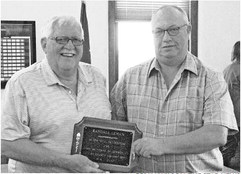
County board chairman Jim Metz ( left) presented a plaque in memory of Myron Brooks to Brook’s daughter, Jilleen Brooks of Jump River. MyronBrooks served 13 years on the Taylor County Board and died on April 21. BRIAN WILSON/THE STAR NEWS
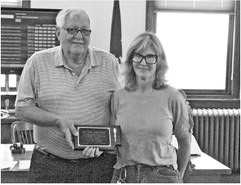
Board member Mike Bub points out where the 18 towers being built by Bug Tussel are located. The towers are scheduled to be in service in the coming months. BRIAN WILSON/THE STAR NEWS
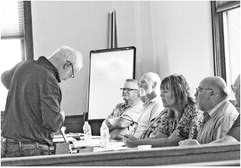
County board chairman Jim Metz (left) presented a plaque in honor of registered nurse Karen Kropp-Mueller who retired from the health department on June 28. BRIAN WILSON/THE STAR NEWS

County forest administrator Luke Williams (left) presented a plaque in memory of Myron Brooks to Brook’s daughter, Jilleen Brooks. Brooks had served many years on the forest committee as well as serving at the state level in county forest management. BRIAN WILSON/THE STAR NEWS
